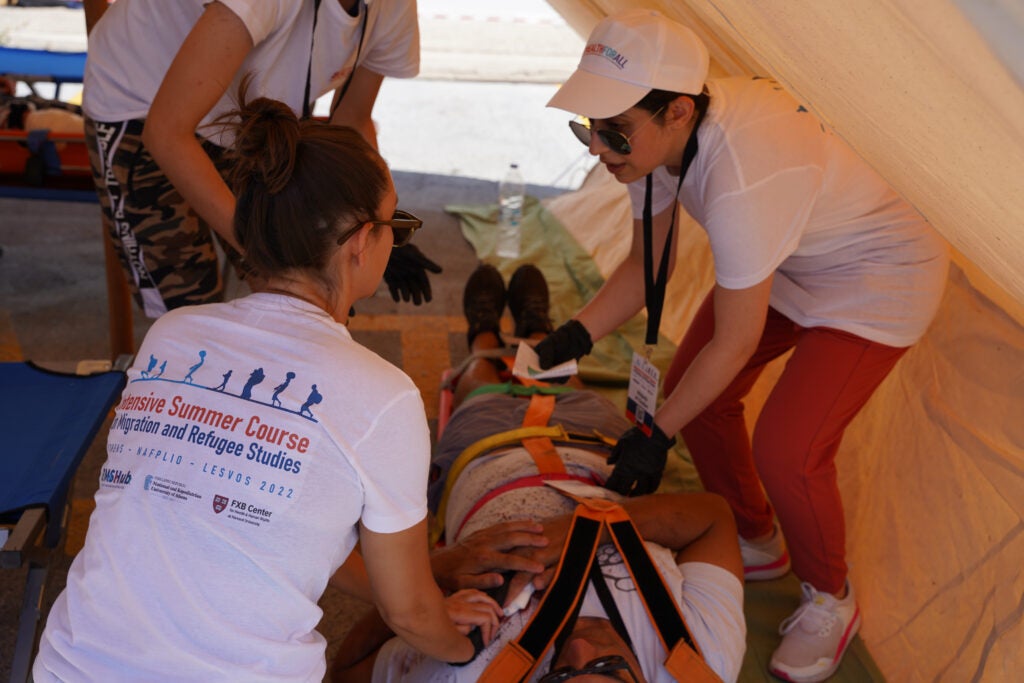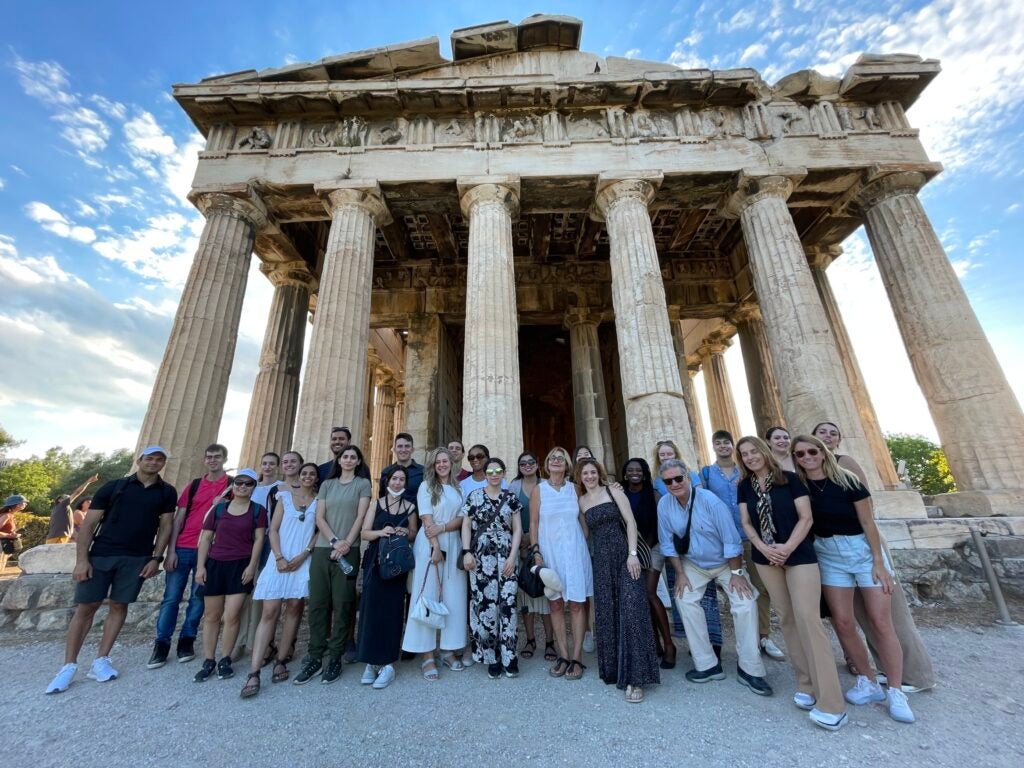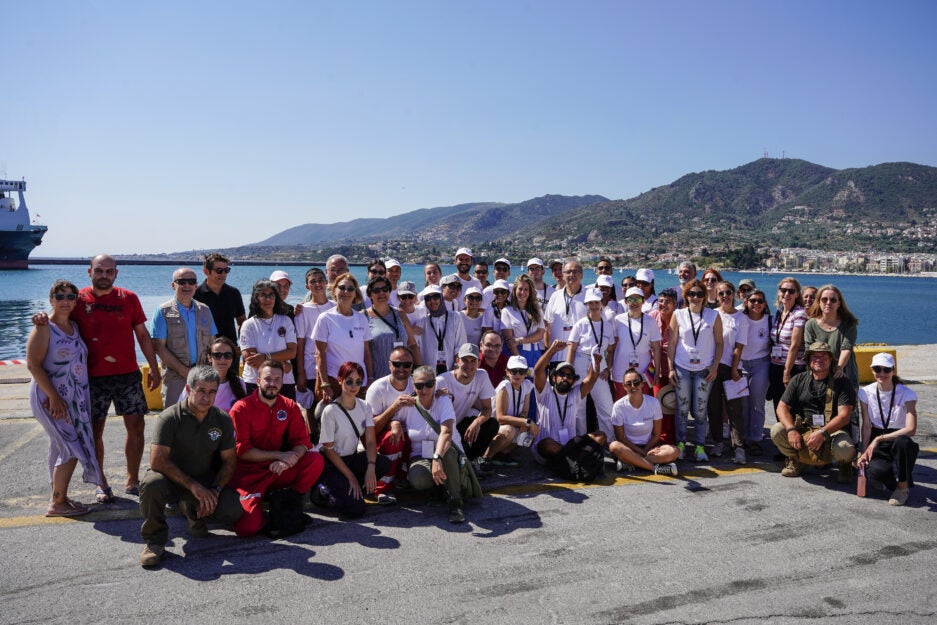July 2022 offered Harvard graduate students interested in migration issues a unique experience. From simulations of rescue at sea to a meeting with the Greek Minister for Migration, from academic lectures by lawyers, environmentalists, journalists and emergency doctors to visits to refugee camps and centers for unaccompanied child refugees, students from five different Harvard graduate schools had the opportunity to spend three weeks in July 2022 immersed in an inaugural intensive three-week summer school on migration and refugee issues in Greece. Alongside the Harvard students were European students and some refugee students, supported by targeted scholarship funds. The program was the product of a collaboration between Harvard University and the National and Kapodistrian University of Athens (NKUA), a collaboration that had been officially marked in the spring of 2022 by the signing of a memorandum of understanding between the two universities which were represented by NKUA’s Rector and the Academic Dean of the Harvard T.H. Chan School of Public Health. The collaboration has been fully supported by the Greek Minister of Education and Religious Affairs. From the Harvard side, the program was run by the Harvard FXB Center for Health and Human rights with significant support from the Harvard Center for Hellenic Studies in Greece. From the Greek side, the program was run by the Refugee and Migration Studies Hub at the National and Kapodistrian University of Athens, with a steering group consisting of faculty from the law school, the medical school, the department of political science and the department of communication studies.

This immersive, interdisciplinary program spanned both theory and practice and took place in three focal areas of Greece: the city of Athens, the city of Nafplio and the island of Lesvos, each of which has its own recent and historic migration flow history. Students were engaged in class work and academic presentations, in conversations with politicians, academics, and activists and in simulation and fieldwork activities. Academic topics covered included international law, refugee rights, violence and exposure to trauma in the context of displacement. Students were also involved in discussions with a wide range of professionals, advocates and experts in discussions about the politics of displacement and repatriation, the practical challenges in addressing service delivery and rights protection, access to health, public perceptions of displacement, child protection and the impact of media during crises.
The program set out to offer participants both a conceptual and practical engagement with key issues related to contemporary forced migration in one of the epicenters of the European migration crisis. At the same time it aimed to allow students to expand their professional, academic and humanitarian networks and come in contact with international and local organizations operating on the ground. The feedback from students suggested that these goals were achieved:
“The best part about the content is that it was both broad/interdisciplinary as well as deep. I liked that we heard from people from all different disciplines- from lawyers, scholars, medical professionals. I especially appreciate that we were able to hear from locals, fisherman, and activists from the Roma community- often these voices and perspectives are left out or hard to find in academic seminars. The depth of knowledge was also a huge plus point- we were exposed to everything , from the history of migration in Greece to the intricacies of the EU.”
“Interfacing directly with practitioners, and listening to the voices of those directly facing the challenges, either refugees or locals were some of the best parts of the program.”
“Both the simulation and visits to the refugee camps and Ministry were eye-opening. I felt that both were the most valuable parts of the program and what I was seeking to gain through attending this program.”
“Incredible first-hand experience on the simulation and camp visits. I was very impressed by how much insights were offered by these short-term visits and experiences. They made me reflect a lot on the reality on the ground.”
During its inaugural year, 14 graduate and PhD students from a range of Harvard graduate and professional schools joined another 9 students from other Universities across the world and had the opportunity to hear and learn from 42 leading scholars, politicians, leaders of international organizations, civil society organizations and members of the local community. The program also welcomed two refugee participants and several Harvard students with refugee and irregular migration backgrounds, helping to partly realize tertiary education for distress migrants who often have little or no access to it.

Applications for the summer 2023 cohort will open this Fall for students from all Harvard graduate schools, including Harvard PhD candidates, as well as for Harvard alumni. Graduate students can choose this course for Independent Study Credit to be credited during the following Fall Semester.

